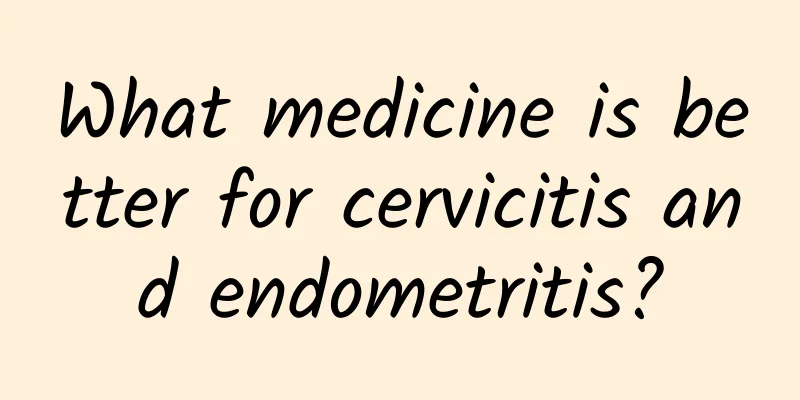What medicine is better for cervicitis and endometritis?

|
The treatment of cervicitis and endometritis requires the selection of appropriate drugs according to the cause and symptoms. Common treatment drugs include antibiotics, anti-inflammatory drugs and Chinese medicine conditioning. Specific medications must be taken under the guidance of a doctor to avoid self-medication. 1. Antibiotic treatment Cervicitis and endometritis are mostly caused by bacterial infection, and antibiotics are the main treatment. Commonly used antibiotics include: Cephalosporins: such as cefixime and ceftriaxone, are suitable for infections caused by Gram-positive and Gram-negative bacteria. Azithromycin: It is more effective against mycoplasma and chlamydia infections. Metronidazole: It is used to treat anaerobic infections and is often used to treat mixed infections. 2. Anti-inflammatory drugs Inflammatory response is the main manifestation of cervicitis and endometritis, and anti-inflammatory drugs can relieve symptoms. Commonly used drugs include: Ibuprofen: A nonsteroidal anti-inflammatory drug that effectively relieves pain and inflammation. Acetaminophen: For mild pain and fever. Glucocorticoids: such as prednisone, are used for severe inflammatory reactions but should be used with caution. 3. Chinese medicine conditioning Traditional Chinese medicine has certain advantages in treating chronic cervicitis and endometritis. Commonly used drugs include: Gynecological Qianjin Tablets: have the effects of clearing away heat, detoxifying, promoting blood circulation and removing blood stasis. Golden Rooster Capsule: Suitable for inflammation caused by damp heat. Motherwort Granules: Helps regulate menstruation and improve the intrauterine environment. 4. Diet adjustment Diet is also important in adjuvant therapy. It is recommended to consume more foods rich in vitamins and minerals, such as: Fresh vegetables and fruits: such as spinach, carrots, and oranges, enhance immunity. High-protein foods: such as eggs and fish, promote tissue repair. Avoid spicy foods as they may increase inflammation. 5. Adjust your lifestyle Good living habits can help you recover from illness: Maintain personal hygiene and avoid using harsh lotions. Avoid overwork and ensure adequate sleep. Check regularly to monitor changes in the condition. The treatment of cervicitis and endometritis requires a combination of medication, diet, and lifestyle adjustments. Antibiotics and anti-inflammatory drugs are the main treatments, and Chinese medicine conditioning and dietary assistance also have certain effects. It is recommended to develop a personalized treatment plan under the guidance of a doctor, while paying attention to daily care to promote recovery. |
<<: Can I eat roasted meat if I have abnormal leucorrhea?
>>: Treatment of abnormal leucorrhea in gynecology
Recommend
Experts will tell you what are the treatments for vulvar leukoplakia?
Vulvar leukoplakia brings great harm and pain to ...
How to self-diagnose pelvic effusion
Many friends who work have little time to pay att...
What are the symptoms of heavy bleeding after medical abortion? There are 4 major symptoms
In real life, some women have to choose to termin...
What are the diagnostic criteria for uterine fibroids?
Uterine fibroids are a common gynecological disea...
How to prevent leakage during abortion
Missed aspiration is one of the possible complica...
Multiple diagnostic methods for hyperprolactinemia
If hyperprolactinemia occurs in life, it will bri...
How to diagnose endometriosis
The diagnosis of endometriosis requires comprehen...
Expert advice: Several effective nursing methods for dysmenorrhea
Women often feel uncomfortable before and after m...
What are the diagnostic criteria for miscarriage?
Abortion cannot be classified as a disease, but m...
What are the main causes of cervicitis?
What are the causes of cervicitis? Do you know wh...
What should you pay attention to after painless abortion recovery?
With modern thinking and open-mindedness, especia...
What should you pay attention to when treating cervical erosion? Teach you how to correctly distinguish the types of cervical erosion
After a physical examination, you often hear the ...
How big are multiple uterine fibroids before they need treatment? Are multiple uterine fibroids benign tumors?
Uterine fibroids are benign tumors and one of the...
What are the symptoms of functional uterine bleeding for those over 47 years old?
Dysfunctional uterine bleeding is common in women...
What should patients with uterine fibroids not eat?
Patients with uterine fibroids should avoid hot, ...









